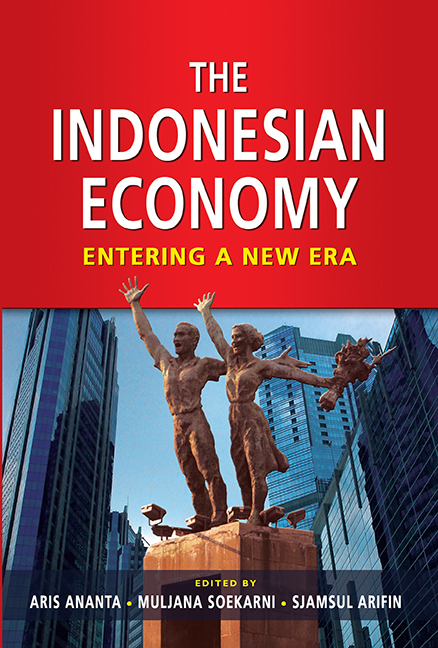Book contents
- Frontmatter
- Contents
- List of Tables
- List of Figures
- Message from the Deputy Governor of Bank Indonesia
- Message from the Director of the Institute of Southeast Asian Studies
- Foreword
- Preface
- Contributors
- PART I INTRODUCTION
- PART II MONETARY AND FISCAL POLICIES
- PART III DOMESTIC ECONOMY
- 7 Regional Heterogeneity of the Large Market and Production Base
- 8 Industrial Relations in the Democratizing Era
- 9 Decentralization and Domestic Trade Interdependence
- PART IV SEARCH FOR NEW PARADIGMS
- Index
7 - Regional Heterogeneity of the Large Market and Production Base
from PART III - DOMESTIC ECONOMY
Published online by Cambridge University Press: 21 October 2015
- Frontmatter
- Contents
- List of Tables
- List of Figures
- Message from the Deputy Governor of Bank Indonesia
- Message from the Director of the Institute of Southeast Asian Studies
- Foreword
- Preface
- Contributors
- PART I INTRODUCTION
- PART II MONETARY AND FISCAL POLICIES
- PART III DOMESTIC ECONOMY
- 7 Regional Heterogeneity of the Large Market and Production Base
- 8 Industrial Relations in the Democratizing Era
- 9 Decentralization and Domestic Trade Interdependence
- PART IV SEARCH FOR NEW PARADIGMS
- Index
Summary
LARGE AND HETEROGENEOUS POPULATION: AN EMERGING ASSET
Indonesia is the world's largest archipelagic country with more than 17,000 islands sprawling from the province of Aceh at its northern tip to the eastern province of Papua. In between the two are eight million square kilometres of land and sea. In terms of population and GDP (income), Indonesia is the largest country in ASEAN. In the more than six decades since its independence in 1945, Indonesia underwent a huge rise in population which has tripled from 73.3 million in 1945 (Badan Pusat Statistik 2005b) to 237.6 million in 2010 (Badan Pusat Statistik 2010). In 2010, Indonesia accounted for 13 per cent of the world's population and was the world's fourth populous country after China, India, and the United States.
It is not surprising then that many countries have eyed Indonesia as a country with emerging opportunities and that Indonesia has been one of the incentives for the creation of the 2015 Asian Economic Community which is to make ASEAN a single market and production base. Indonesia is a very promising market due to its huge number of potential customers who have rising incomes and aspirations. It is also a large pool of potential human resources as Indonesians have beome more educated, healthy, and mobile.
This chapter examines the Indonesian population in order to shed more light on the country's potential as a market and production base. The information given is also very important for development planning. Another feature of this chapter is its focus on the regional variations within Indonesia. Democratization in Indonesia, since 1998, has been accompanied by decentralization through the regional autonomy policy, which transferred much of the decision making power to regional, in particular, district governments. Since its decentralization, it has become more difficult to speak of “Indonesia” as a whole because one region can be very different from another and the country as a whole can also be very different from its past because many changes have occurred administratively, geographically, and demographically. Nonetheless, the large country of Indonesia had already shown its heterogeneity well before decentralization took place.
The novelty of this chapter lies in its discussion of the many new faces within Indonesia's population. The following section starts with a discussion on what is called the “Big Bang” decentralization.
- Type
- Chapter
- Information
- The Indonesian EconomyEntering a New Era, pp. 193 - 243Publisher: ISEAS–Yusof Ishak InstitutePrint publication year: 2011



